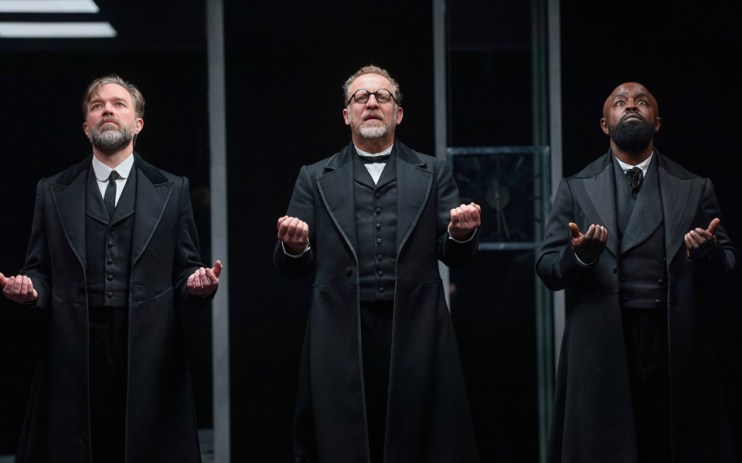The Lehman Trilogy returns to the West End and it’s as vital as ever

The Lehman Trilogy, first performed in London in 2018, is one of the great plays of recent times, a perfect meeting of vision and execution, text and cast, time and place.
Coming a decade after the financial crash, Sam Mendes’ production won five Tony awards and made its inevitable journey across the Atlantic to Broadway. Now it’s back in the West End with an all new cast, just in time to welcome a new recession.
For those who missed it the first time, it follows the eponymous Lehman brothers, flat broke Jewish immigrants fresh off the boat who grow their Alabama textile business into a cotton wholesaler, then a bank, then an investment firm, inventing the concept of middle-men and financial vehicles along the way.
But zoom out a little and you can see the story of America as it lurches from the calamity of civil war into the blinding lights of the 20th century, elbowing its way to the centre of the world stage. Zoom farther still and there’s the story of capitalism itself, a system stumbling from a collection of traders to an interconnected, algorithmic network so vast and complex that it’s essentially unknowable, a sleepless machine that exists to create, as if by magic, strings of zeros in the bank accounts of the lucky few.
Until one day in 2008 it stops, and Lehman Brothers goes bust, taking the world economy with it.
It’s a testament to the quality of the writing, and of the deeply human portrayals of the brothers, that you could sit a Marxist next to a banker and both would emerge from The Lehman Trilogy satisfied.
Covering 150 years, three generations of Lehmans, two world wars and two calamitous recessions, it packs a dizzying amount into its three and a half hours. But filtering everything through the lens of this brilliant, cursed family means it never feels like a history lesson.
The original cast was made up of Simon Russell Beale, Ben Miles and Adam Godley, a seemingly impossible act to follow. In come Nigel Lindsay, Michael Balogun and Hadley Fraser, and while they never quite hit the same heights, they feel immediately at home in the roles.
The trio play not only Henry, Emanuel and Mayer Lehman, but their ancestors and all the peripheral characters in their lives, flitting from dour financier to precocious child to timid debutante with an incredible verbal dexterity, each one an accomplished physical comic.
A second viewing highlights the play’s easy poetry, filled with callbacks and phrases that echo through the generations, giving it the feel of a children’s parable.
And then there’s that set, designed by Es Devlin, a rotating glass cube, the archetypal 21st century office, filled with nondescript boxes like the ones carried by Lehman Brothers bankers as they left the office for the last time on that morning in 2008. But those boxes become a desk, or a stool, or the walls of a room hardly big enough to stretch one’s arms, while the glass partitions become a canvas for the Lehmans, who scrawl their plans upon it in black marker pen. Behind the cube a single curved projection takes us from the fields of Alabama to the chaos of war to the algorithmic workings of the investment machine.
What begins as a relatively slow-burn tale ends up hurtling towards its terrible conclusion like a rocket aimed directly at the sun, at once thrilling and awful.
The Lehman Trilogy is a modern classic, absolutely worth a second watch if you saw it last time, and nigh-on essential if you didn’t.
